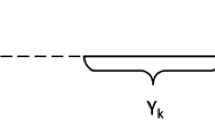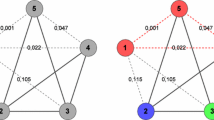Abstract
We consider a variant of no-wait flowshop scheduling that is motivated by continuous casting in the multistage production process in steel manufacturing. The task is to find a feasible schedule with a minimum number of interruptions, i.e., continuous idle time intervals on the last production stage. Based on an interpretation as Eulerian Extension Problems, we fully settle the complexity status of any particular problem case: We give a very intuitive optimal algorithm for scheduling on two processing stages with one machine in the first stage, and we show that all other problem variants are strongly NP-hard. We also discuss alternative idle time related scheduling models and their justification in the considered steel manufacturing environment. Here, we derive constant factor approximations.
Similar content being viewed by others
References
Ball, M. O., & Magazine, M. J. (1988). Sequencing of insertions in printed circuit board assembly. Operations Research, 36(2), 192–201.
Bläser, M. (2004). A 3/4-approximation algorithm for maximum asymmetric TSP with weights zero and one. In Lecture Notes in Computer Science: Vol. 3122. Proceedings of the 7th international workshop on approximation algorithms for combinatorial optimization problems (APPROX) (pp. 61–71). Berlin: Springer.
Eiselt, H. A., Gendreau, M., & Laporte, G. (1995). Arc routing problems II. The rural postman problem. Operations Research, 43(3), 399–414.
Garey, M. R., & Johnson, D. S. (1979). Computers and intractability. New York: Freeman.
Giaro, K. (2001). NP-hardness of compact scheduling in simplified open shop and flowshop. European Journal of Operational Research, 130, 90–98.
Giaro, K., & Kubale, M. (2004). Compact scheduling of zero-one time operations in multi-stage systems. Discrete Applied Mathematics, 145, 95–103.
Gilmore, P. C., & Gomory, R. E. (1964). Sequencing a one state-variable machine: a solvable case of the traveling salesman problem. Operations Research, 12, 655–679.
Graham, R. L., Lawler, E. L., Lenstra, J. K., & Rinnooy Kan, A. H. G. (1979). Optimization and approximation in deterministic sequencing and scheduling: a survey. Annals of Discrete Mathematics, 5, 287–326.
Gutin, G., & Punnen, A. P. (2002). The traveling salesman problem and its variations. Berlin: Springer.
Hall, N. G., & Sriskandarajah, C. (1996). A survey of machine scheduling problems with blocking and no-wait in process. Operations Research, 44(3), 510–525.
Harjunkoski, I., & Grossmann, I. (2001). A decomposition approach for the scheduling of a steel plant production. Computers & Chemical Engineering, 25, 1647–1660.
Kabadi, S. N. (2002). New polynomially solvable classes and a new heuristic for the traveling salesman problem and its generalization. Discrete Applied Mathematics, 119, 149–167.
Karp, R. M. (1972). Reducibility among combinatorial problems. In R. Miller & J. Thatcher (Eds.), Complexity of computer computations (pp. 85–103). New York: Plenum Press.
Laporte, G., & Osman, I. H. (1995). Routing problems: a bibliography. Annals of Operation Research, 61, 227–262.
Lenstra, J. K., & Kan, A. H. G. R. (1976). On general routing problems. Networks, 6(3), 273–280.
Orloff, C. (1974). A fundamental problem in vehicle routing. Networks, 4, 35–64.
Pacciarelli, D., & Pranzo, M. (2004). Production scheduling in a steelmaking-continuous casting plant. Computers & Chemical Engineering, 28(12), 2823–2835.
Piehler, J. (1960). Ein Beitrag zum Reihenfolgenproblem. Unternehmensforschung, 4, 138–142.
Reddi, S. S., & Ramamoorthy, C. V. (1972). On the flow-shop sequencing problem with no wait in process. Operational Research Quarterly, 23(3), 323–331.
Röck, H. (1984). The three-machine no-wait flow shop is NP-complete. Journal of the Association for Computing Machinery, 31(2), 336–345.
Rote, G., & Woeginger, G. J. (1998). Time complexity and linear-time approximation of the ancient two-machine flow shop. Journal of Scheduling, 1(3), 149–155.
Sahni, S., & Cho, Y. (1979). Complexity of scheduling shops with no-wait in process. Mathematics of Operations Research, 4, 448–457.
Schwindt, C., & Trautmann, N. (2003). Scheduling the production of rolling ingots: industrial context, model, and solution method. International Transactions in Operational Research, 10(6), 547–563.
Sriskandarajah, C., & Ladet, P. (1986). Some no-wait shops scheduling problems: complexity aspect. European Journal of Operational Research, 24(3), 424–438.
Sviridenko, M., & Woeginger, G. J. (2000). Approximability and in-approximability results for no-wait shop scheduling. In 41st Annual symposium on foundations of computer science (FOCS) (pp. 116–125).
Vairaktarakis, G. L. (2003). Simple algorithms for Gilmore–Gomory’s traveling salesman and related problems. Journal of Scheduling, 6(6), 499–520.
Wang, Z., Xing, W., & Bai, F. (2005). No-wait flexible flowshop scheduling with no-idle machines. Operations Research Letters, 33, 609–614.
West, D. B. (2001). Introduction to graph theory (2nd edn.). Englewood Cliffs: Prentice-Hall.
Author information
Authors and Affiliations
Corresponding author
Additional information
The first author is supported by the Deutsche Forschungsgemeinschaft (DFG) as part of the Priority Program “Algorithm Engineering” (1307). The second author is supported by a fellowship within the Postdoc-Programme of the German Academic Exchange Service (DAAD).
Rights and permissions
About this article
Cite this article
Höhn, W., Jacobs, T. & Megow, N. On Eulerian extensions and their application to no-wait flowshop scheduling. J Sched 15, 295–309 (2012). https://doi.org/10.1007/s10951-011-0241-1
Published:
Issue Date:
DOI: https://doi.org/10.1007/s10951-011-0241-1




